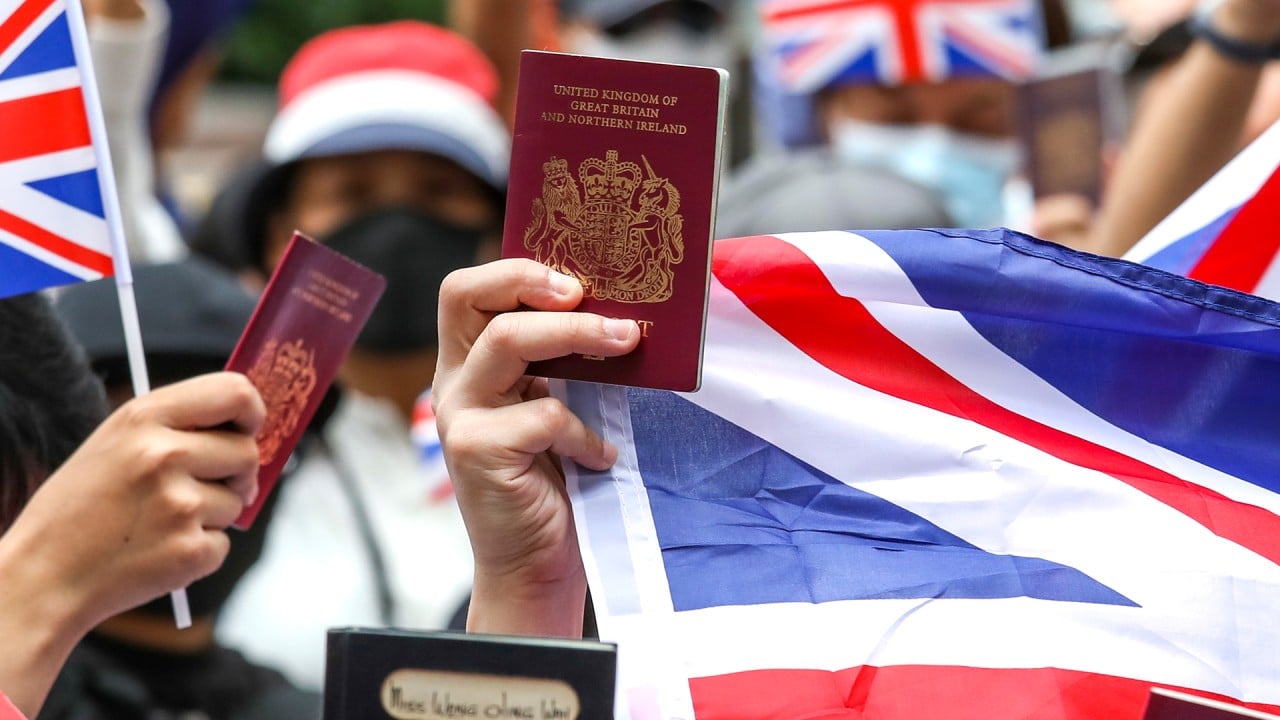
6 months on for Hongkongers in Britain under BN(O) scheme – how are they doing and where are they now?
- For Hong Kong families who left for Britain, the difficulties started before they even left the city
- Once overseas, finding jobs and integrating into local communities has also been challenging, but families say they are making progress
Once in Britain, Chan, 43, and his wife, 42, both registered nurses, put their eight-year-old daughter in a local state school, while his 13-year-old son, unable to secure a place, is attending a private school that costs HK$53,000 (US$6,900) per term.
The family are renting a three-bedroom house for HK$9,600 a month.

With both parents out of work, the Chans expect to live on their savings for about a year until they can sit the British licensing exams next year to become nurses for the National Health Service (NHS).
While the cost of living in Britain is lower than in Hong Kong, Chan’s family was among those caught out by a rule change under which BN(O) passports were no longer recognised as valid proof of identity by Hong Kong’s Mandatory Provident Fund (MPF) Schemes Authority.
That meant that Chan and his wife have been unable to claim the estimated HK$2.5 million pension they have accrued over the past 20 years – one of their biggest assets, and one they had hoped to use to put a down payment on a house in Britain.
The inability to access their funds as planned has been yet another obstacle to building their new life in Britain, they say.
“Just because I am a BN(O) holder, I cannot retrieve my personal assets,” Chan said. “If I could retrieve my MPF it would be easier for me to buy my new home and support the education of my son.”
Hong Kong migrants in Britain get help from Catholic Church
Difficulties begin before departure
In the six months since Britain began accepting applications for the BN(O) visa scheme, fresh arrivals to the country have adapted to new cities and surroundings, while also facing unexpected challenges.
Emerging communities of Hongkongers have sprung up in areas such as South London, Manchester and the East Midlands as arrivals trickle in.
Britain first announced the visa scheme last July in response to Beijing’s imposition of the national security law on Hong Kong. The scheme allows those with BN(O) status and their dependents to live, work and study in the country for up to five years, and to apply for citizenship after six.
An estimated 5.4 million of Hong Kong’s 7.5 million residents are eligible to apply for the new visas.
Between January 31 and the end of March, some 34,300 Hongkongers applied for the new visas, with 7,200 already approved, according to official figures. The British Home Office has estimated that between 123,000 and 153,000 adults and their dependents will apply for the visa this year.

In January, Beijing and Hong Kong said BN(O) passports would no longer be recognised as valid travel and identification documents, with the MPF Schemes Authority following suit in March.
Under the laws governing the MPF, there are only six reasons for early withdrawal of funds before the age of 65. One of them, withdrawing on grounds of permanent departure, requires documentary proof that the applicant is permitted to live in a place outside Hong Kong. With the BN(O) visas no longer accepted, departing Hongkongers have found their pensions stuck in limbo.
Applicants have found themselves faced with the option of either applying through a different type of residency, or waiting until they gain full citizenship under the BN(O) scheme after six years, says employment lawyer Duncan Abate.
“It is not that the money disappears, it just means that they cannot get it early,” says Abate, a partner at the law firm Mayer Brown.
Acknowledging the thorny political issue behind the rule change, Abate adds that the regulator was clear that “anything derived from BN(O), the trustees have to ignore”.

06:15
BN(O) passport holders flee Hong Kong for new life in the UK, fearing Beijing’s tightening control
In a statement to the Post, the MPF Schemes Authority says trustees have a “duty to observe Hong Kong laws when handling the administrative matters of MPF schemes including processing applications for early withdrawal of MPF”.
The hold on his funds and resulting disruption to his plans left Chan angry, particularly after he was told by a representative of the company administering his pension that his withdrawal would be processed once he obtained his BN(O) visa. Once he had the visa in hand, however, he was told his application would be rejected.
Anita Tam* has found herself in a similar position, as she too discovered she would be unable to withdraw her HK$500,000 pension after arriving in Britain.
Pension shortfalls keep 9 of 10 middle-income Hongkongers toiling
She has been renting a four-bedroom house for HK$11,000 a month in Nottingham since last December with her brother and his wife, their three-year-old daughter, and her 74-year-old retired father. Tam, her brother and his wife, all in their thirties, had also planned to put their pensions totalling around HK$1 million towards a down payment on real estate.
“If we can get back the money, we can buy a house here and put down roots,” she says.
Overqualified, underemployed
Another challenge faced by new arrivals is securing a job in Britain in the same field.
Tam worked as an accountant for an advertising company in Hong Kong, but has been unable to find work in the same profession in Nottingham. Instead she has an administrative job in an office, preparing and scanning documents for NHS patients.
Her brother, who had been in sales, now works in a warehouse, while his wife, who was in marketing, is now a secretary.
Tam describes her new job, where she earns a fraction of what she did in Hong Kong, as “simple work”, and says she worries she may need to hold down multiple gigs to support herself.

01:54
Hongkongers with BN(O) passports could be eligible for UK citizenship if China imposes security law
The Tam family chose Nottingham for several reasons: they knew someone who lived there, rents were low, the schools were good and the weather was nicer.
The city of some 333,000 gets more sunshine, Tam says, “unlike Manchester, which has rain almost every day”.
However, Nottingham did have one unexpected drawback: Tam says she found it nearly impossible to understand the local accent. It has also been a challenge adapting to the language and culture, and despite the sun, the cold weather is a far cry from Hong Kong’s.
Once she got used to the accent, however, she says she has found the people kind and friendly, and willing to engage her on matters concerning Hong Kong.
“Our biggest concern is our jobs. We hope to find a better job, and it would be better to find the same job as we did in Hong Kong,” she says. “If we cannot sustain our living here, we might need to go back to Hong Kong.”

Krish Kandiah, the founder of UKHK, a group that draws on a network of 650 churches to assist new arrivals from Hong Kong, says that job hunting is a common challenge, as some newcomers’ existing professional qualifications are not recognised, while others are trying to enter new fields.
Employment prospects were not helped by a lengthy national lockdown and the lingering effects of the coronavirus pandemic, which forced some businesses to furlough staff, the 49-year-old adds.
Fred Wong, of HKARC, another organisation assisting new arrivals, says that while skills can be transferable, there are still hurdles. Newcomers who have worked as plumbers or electricians may have issues with their English skills, he says, while others with experience in fields such as accountancy and financial services may find themselves stuck in more junior positions than they held in Hong Kong.
In April, the British government launched a £43 million (US$59 million) package to support BN(O) families settling in the country, funding local councils nationwide to help the new arrivals from Hong Kong with housing, education and employment.

Uneasy, but integrating
Not all of the challenges faced by new arrivals are economic.
The Chans were the first Hong Kong family in their neighbourhood, and Chan’s wife worries that they may encounter racism there, particularly amid a worldwide rise in anti-Asian hate, though they have not so far.
Chan says one of his friends described an incident in Bristol in which a man twisted his face in disgust at her and remarked “Chinese are everywhere” as she was out shopping.
No place for anti-Asian hate in London, mayor assures Hongkongers making move
Chan and his wife have tried to prepare their children for such encounters, explaining to them that nerves are raw after a year of lost loved ones and economic hardship, and telling them to try to de-escalate any conflicts.
“I believe that most of the local British [people] are open-minded, and they have been taught in school to respect other beliefs,” Chan says. “But I have mentioned to my son and daughter that they may encounter this. If it is just talk, you can ignore it. You don’t need to further argue with them because maybe you can … put yourself in a difficult situation.”
Still, Chan says his kids have worked hard to get their English up to snuff, and both have taken to school life, with his son picking up cricket and his daughter joining the local football club.

04:03
‘Nothing is scarier than staying’: Hong Kong family uproots as fear looms over city’s future
Chan, meanwhile, is passing the time until his nursing exam by learning to drive, and is keen to get to know the local community and his neighbours better.
“When the lockdown lifts, I want to make some dim sum and invite her for tea,” he says of one neighbour, originally from India, who has answered his questions about the neighbourhood.
That kind of integration is important, Kandiah says, noting Britain’s chequered history of accepting new arrivals. He points to the legacy of the Windrush scandal, in which hundreds of Caribbean immigrants were wrongly targeted by the British government, as well as the rise in East Asian hate amid the coronavirus pandemic.
“Often that kind of racism is there because people fear what they do not know or understand, and integration allows us to recognise another person as having value, dignity and worth,” he says.

The Chans, meanwhile, were not the only Hong Kong family in the area for long. Chan’s wife, who joined numerous social media groups for new arrivals, tells him that more than 120 families have moved to the area in the past six months, with six enrolling their kids in the same school as their daughter.
“When we pick up and drop off my daughter, we have a chance to meet up with them every day,” he said.
Tam says the beginnings of a community are taking root in her area too, with newcomers sharing tips such as where to find the best Chinese food. One of the challenges in Britain, she says, has been learning to cook, as her family – like many in Hong Kong – ate out frequently.
Despite his family having settled into their new life in England, Chan admits to sometimes regretting leaving his home.
“I hope I can make a contribution here, but I also feel really sad that I could not stay with my parents, my friends, my colleagues and my patients to help them and work together in Hong Kong.”
*Names changed at interviewee’s request

